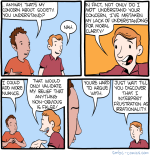Copernicus
Industrial Grade Linguist
Untermensche, while we're trying to school you in elementary logic, we might as well also introduce you to the logical fallacy known asAs I've been telling unter, all of this comes down to his fundamental misunderstanding of the difference between a valid argument and a sound argument--one of the first things you learn in an introduction to logic. Logical possibilities and impossibilities are basic thought experiments, as Pyramidhead was pointing out. If a claim can be true in some hypothetical world, i.e. be consistent with all other true statements in that imaginary world, then it is a logical possibility. If it cannot be true in any hypothetical world, then it is a logical impossibility. I suspect that unter may have tumbled to all of this by now, but he isn't admitting it, if he has.
So, if you can imagine a world where magic works, and a man knows a magic spell that allows him to jump 100 feet in Earth's gravity, then it is logically possible that a man can jump 100 feet, however implausible such a claim might be in terms of the real world.
If you can imagine something you think it is now logically possible?
That is absolute nonsense.
If you learned it in some school you should demand your money back.
An argumentum ad nauseam (also known as an argument by repetition) is the logical fallacy that something becomes true if it is repeated often enough. An ad nauseam argument that can be easily shown to be false leads to the "point refuted a thousand times".
Since you seem unwilling to click on links that might help you understand basic logic, here is the description of "point refuted a thousand times" (PRATT):
A point refuted a thousand times, commonly abbreviated as PRATT, refers to a point or argument that has literally been refuted so many times that it is not worth bothering with.
It is a common phrase on Internet forums — as debates have a tendency to go in circles. Once people have refuted a point the first thousand times, it's hard for them to muster the motivation to do it again. It's a very common accusation levied at creationists, who are notoriously unimaginative in what they say.[2] Coincidentally, PRATTs can usually be found coming from prats (British English for "idiots").

